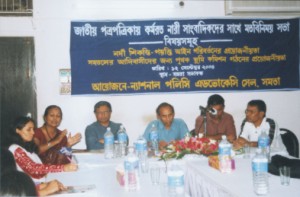Event
Giving
Back Land to the Landless
SULTANA
RAZIA
A
few days ago I met some Santals and they told me that they
were now working as sharecroppers in their own lands. Being
poor, illiterate and a minority group, they have been constantly
being exploited and oppressed by those who have more power.
Their lands have been grabbed through fraudulent practices;
sometimes they have lost their land because our complex land
laws do not give them the support they need.
 To
the indigenous people land is very important and our agricultural
methods have originated from them. They call the land-- Ma--
meaning mother and some times it means more than that. Complicated
land laws and the land systems often have a negative effect
on poor people, more so in the case of indigenous groups. To
the indigenous people land is very important and our agricultural
methods have originated from them. They call the land-- Ma--
meaning mother and some times it means more than that. Complicated
land laws and the land systems often have a negative effect
on poor people, more so in the case of indigenous groups.
Among
the few organisations working on this issue Samata is one
of the pioneers. On September 12, the National Policy Advocacy
Cell of Samata organised a daylong discussion meeting with
women journalists. The main objective was to create awareness
about the proper distribution of Char-lands and to establish
a separate land commission for the ethnic people of the plain
land.
In the
inaugural speech Samsul Huda, the advisory member of Samata,
stated how the people of the Chars (who live in the sandy
land recovered from the river bed) are suffering due to ineffective
laws related to Alluvium and Diluvium. In the river when a
new land rises, some individuals use their muscle power to
grab that land eventhough it legally belongs to the landless.
He also added that indigenous people are mostly affected by
the land system of the country and in most cases it is the
women and children who are vulnerable.
Jahid
Rahman and Sultana Akhter Ruby, researchers of Smata presented
two concept papers at the meeting. According to the law, said
Rahman, alluvium land means the land which is devoured by
the river and Delluvium means a deposit of sand caused by
former action of flowing waters.
In Riverine
Chars in Bangladesh, a report by Irrigation Support Project
for Asia and Near-East found that in our country there are
approximately 1722.89 sq.km char lands which can accommodate
at least 150 million land less people through proper distribution.
Samata
is trying to make people aware about the loopholes of the
present land system of the country and they want to amend
the laws of Alluvium and Delluvium. State Acquisition and
Tenancy Act 1951 was amended in 1994 and according to this
act there are a lot of problems for the poor to acquire the
land.
The main
problems of the present laws include : The government cannot
seize the Delluvium lands and so cannot distribute the lands
to the landless. Violence is a regular consequence of land
disputes and the law only encourages the practise of fake
deeds.
So for
the poor landless people this law should be amended. Through
proper distribution of the char lands almost 1560,384 people
can be rehabilitated.
Sultana
Akhter Ruby, in an another presentation explained why they
are campaigning for the separate land commission for the ethnic
people of plain lands.
Land issues
are a major worry for the indigenous people in our country.
Our government has usually ignored their land rights, as our
land system doesn't have any concept of vested land or common
property. The Government has occupied a lot of their lands
in the name of 'development' or 'reserved forest'. Modhupur
reserve forest is one of them. Indigenous people of the plain
land gradually lost their lands and as their traditions and
culture is land oriented, they lost their identity as well.
The Government, suggested Ruby, should respect their traditional
and customary land rights and form a separate land commission
for them.
One of
the other reasons behind the sufferings of these people is
that we do not address them as indigenous they need constitutional
recognition in order to survive.
Copyright
(R) thedailystar.net 2004
|
